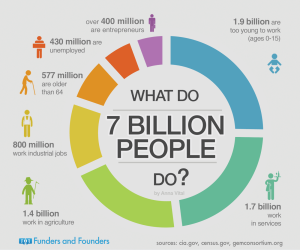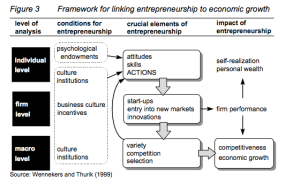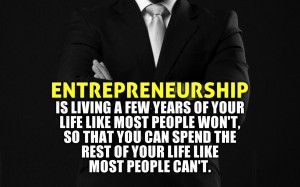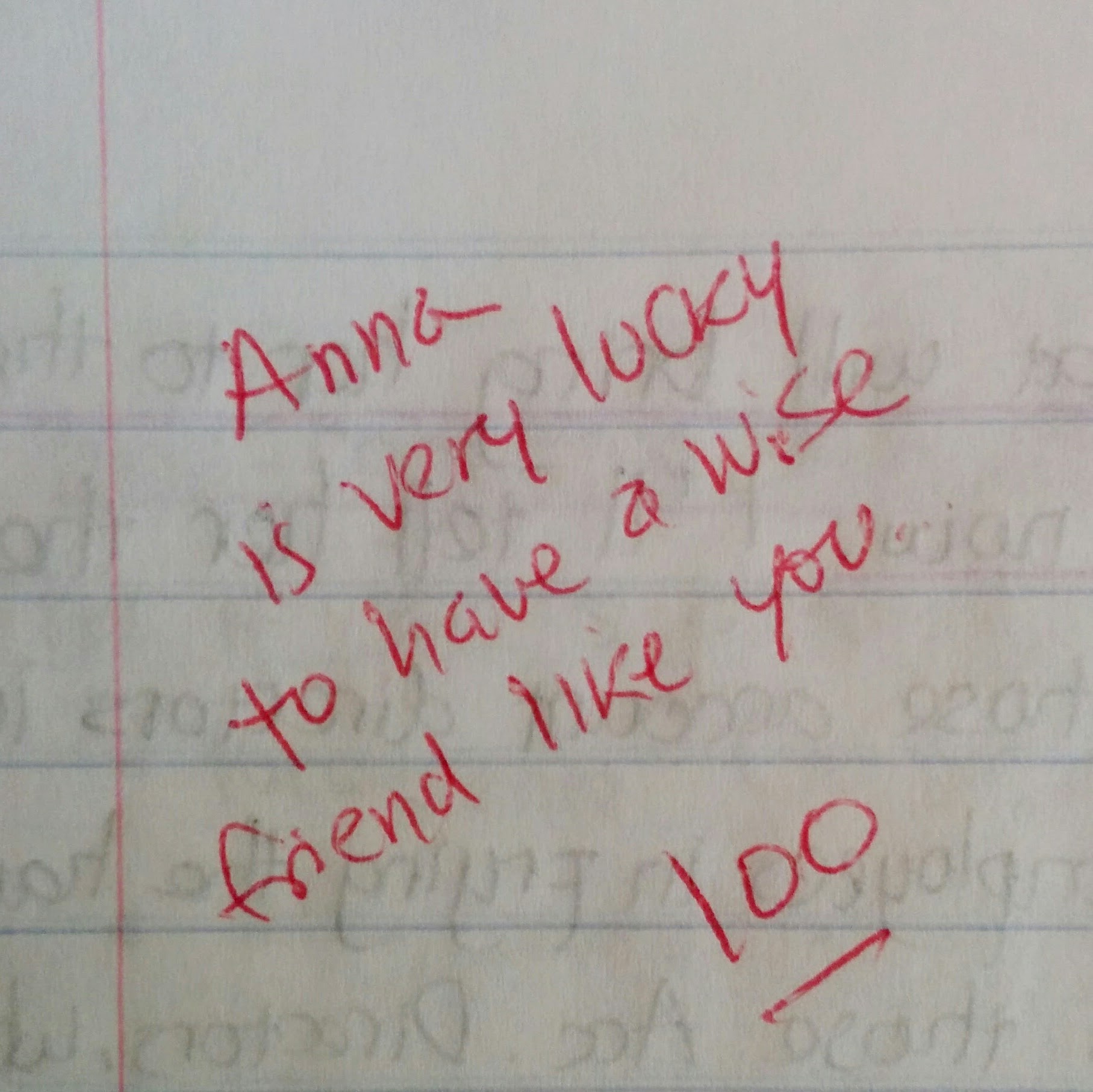What do you have in mind when you hear the word entrepreneur? Is it Diane Hendricks, Jin Sook Chang, Martine Rothblatt, etc? (Yes, they’re all women. And yes, they’re all some of the richest woman entrepreneur worldwide). Or is it your neighbor who has been struggling with his/her own internet café?
Either way, you’re on the right path. Owning your own business is a culture that’s been cultivated in recent years. According to Global Entrepreneurship Monitor (Babson College), the total entrepreneurial activity worldwide has shown a steady increase in general across all different economic levels despite a worldwide economic struggle over the past few years, with mixed indicators in many countries. However, compared to the number of other jobs, people who own their own business are still way too low.

What do you do?
Is this something we should be concerned? If you’re living in a developing country, you should; and if you’re living in a developed country, you should too. Why? This framework that I took from this trusted research paper might be able to explain.

Entrepreneurship –> jobs creation –> economic growth
It’s pretty easy to understand actually. First thing you need to understand is that—according to the authors—the history of the rise and fall of nations has shown that cultural vitality, thriving sciences and high tide in entrepreneurship often coincide. It makes so much sense. To be an entrepreneur isn’t as easy and quick as you think. Therefore, when you make it, I think you’ll get this sense of self-reliance that you never know before. You become braver, tougher, more optimistic, even stronger. Or you might become more selfish, ambitious, arrogant, even skinnier (hint: Apple’s Steve Jobs). Whatever that is, you become a much more productive citizen for your country because with all the perseverance you have (I intentionally don’t say talent because you can always be talented when you’re persevered), you turn all those ideas into actions.
Actions lead to new firms or start-ups which create the competitiveness in market by forcing the entrepreneurs to always innovate to be able to avoid the obsolesce. Competitiveness in the national level will then increase the economic growth as the jobs are created sustainably. According to most of economics theories, job creations will generate economic growth.
There you go, we the tiny human being can actually benefit the country.
How about Indonesia? How are we doing for entrepreneurship? Here’s a glance of GEM’s 2013 report on one of the world’s fastest growing economies:
The level of early-stage entrepreneurial activity (TEA) in Indonesia is high; furthermore, it is notable that both men and women are equally likely to be engaged in TEA.
The average entrepreneur in Indonesia has at least secondary education, income in the low to middle range, either male or female, working mostly in the trading and services sector.
Enablers and Constraints: The biggest enabler is the dynamic internal market; the main constraint is a lack of government support for entrepreneurial programs.
Initiatives Supporting Entrepreneurship: Many policies and programs have been initiated to enhance entrepreneurship; however those are led by different agencies or ministries, and there is a lack of communication and coordination, which reduces their impact.
Challenges for the Future: Indonesia needs to increase innovation and maintain the sustainability of its businesses. Government support for entrepreneurs is also in need of improvement, with regard to both regulation and programs. Finally, the sharing of new know-how and technologies (R&D transfer) within Indonesia’s entrepreneurship ecosystem must be improved.
So, amongst any other countries, Indonesia has a considerably high early-stage entrepreneurial activity with low fear of failure. Not bad! (Although we actually need many more entrepreneurs)
I personally prefer having my own business someday (hopefully) to contribute to the nation rather than be involved in the government system. It’s just not in my blood. Knowing that Indonesia’s on the rise in terms of entrepreneurship activities, I’m sure that I’m on the right track. Even more so, my dear friend that I met in USA two years ago just made it clearer that a dream is the leap of faith that we need.
I met Ridwan when I was looking for a place to stay before my semester at James Madison University, Virginia, started. Long story short, I got another place to stay, but we became friends since then because he was the only one from Indonesia who e-mailed me back. Then I got to know him and his incredible cooking skills and very passionate working attitude. He always cooked me delicious food whenever I visited, also cured my craving for Indonesian food. He’s just the best. And when I knew he won one of the local food business competition, I just thought that he could be the great example of how an ordinary person who has been working for half of his life can still make his dream come true.

Me and Ridwan. Aren’t we cute?

All the Indonesian food we cooked together to cure our cravings. (left: stir-fried green beans with tempeh; up: YUMMY Indonesian chili sauce; right: fried salted fish; down: lalapan or just fresh vegetables)
Here’s our Q&A:
First of all, congratulations for winning the What’s Cooking Competition, tell us more about it!
First of all, thank you so much. It was back in September 2014; there was an article in local newspaper about What’s Cooking. It is about food related business concept competition, the class/workshop took about 6 months from the beginning, concept stage until the final pitch competition stage. We met in the class room at least once or twice a month. More info can be found here.
After we attended that meeting, my partner and I were interested since we do have a plan to open small café in the future. This is great opportunity for learning. Our first intention was to learn how to open a small business, we never thought about winning this competition. I agree with the purpose of this program: everyone is a winner after leaving this program.
I also let the participants and speakers tasted my food, but it’s not the main criteria for the judges. It is about concept, what type of food business, menu, target market, etc.
What do you do now and how long have you been cooking?
I’m a restaurant assistant manager at a USA franchise buffet and grill located in Harrisonburg, VA. Cooking is my passion since I was really young. I grew up in big family with parents involved in food business. I was busy helping my mother to cook in the kitchen for her business and my father to sell produce at pasar/traditional farmers market. After I moved to the US, my passion for cooking becomes more serious. I started to work in the kitchen as a dishwasher, line cook, server, grill cook, to Assistant Manager. And finally I started blogging about the foods recipe at http://www.riceandcoconut.com in 2011, along with food photography. I love to share foods with family, friends, and neighbors.
My first experiences to cook for private party is a wedding for 100 plus people and recently I catered food for my friend’s bridal shower. They all rave about the foods, so I have a confidence that I can open a small business for broader community to share about my passion for food.
Is having your own food business your dream?
Yes, it is my dream to have a small food related business, catering or a small café, so I’m working on it.
Why café and not food truck?
I choose café because I want to create small intimate space with Indonesian décor like batik and batik mask with tropical feeling, so I can introduce Indonesian cultures with foods and the customers will enjoy the vibe while dining at BoBoKo. BoBoKo/rice basket will be used as a serving dish and will be on display as well.
Can you please tell us briefly how your café is going to run? (what food, when to launch, where to be, etc.)
BoBoKo: Indonesian Café is a casual restaurant serving Indonesian traditional and fusion foods. Right now we are working on the location, possibly downtown or strip mall in Harrisonburg, I hope I can open the door for business in January 2016.
What are the challenges in preparing the business plan?
Budgets, of course. Lots of $$$ and we have lot of work to do—also to find the right location.
We’re involved with local small business development center and business services provided by SBDC in what’s cooking program and they have been helpful to us.
How do you manage the pricing for the food you’re going to sell?
This is another benefit from the “What’s Cooking” program. Their speakers taught me a lot for the pricing process.
Do you think it’d be more difficult for you to open your own business had you not won the competition? (i.e. cost and expenses)
Yes, of course. We have to build our business concept without knowledge from scratch. Winning the competition has helped us to actually start. We use some vouchers we got from winning, but most of the expenses is on our own.
How do you manage the teamwork between you and your partner?
I think it is easier to do business with people that we know for a long time. One of us will be in charge in the back of the house and front of the house, but we do need more people to help us later.
What do you think about the market for Asian cuisines? (considering where you live now)
Harrisonburg is diverse in terms of for food and foodies, lots of ethnic restaurant here. As you know there is no Indonesian restaurant here yet, but if we think about target market I have to provide menu with “Indonesian fusion” although most foods are traditional Indonesian food.
Do you think it’s always good to work for someone else first then establish your own business? Or the other way around?
I think so because we’ll gain knowledge and experiences from the past employers and we need to know about restaurant business. I personally don’t think I can do this without experiences (that I’ve gained).
What do you expect to see in your business within the next couple of years?
It is hard to tell but I hope the business grows and runs very well. And I probably will have another conversation with you in the future about it. I just can’t wait to share Indonesian food with Harrisonburg community.
Takeaway points:
- No matter where you are, you can always start a business.
- If there’s a business plan competition, join and win prizes to execute the plan.
- No matter how old you are, you can always start a business.
- Find a partner that you’ve known for a long time. Not necessarily a family member, just someone you trust so well to work with you through thick and thin.
- No matter what you do now and how long you’ve been doing that, you can always start a business. Got experience? Good. Not enough experience? Learn as you go
- As long as you do it all with passion, you won’t give up and there will be a point where you succeed. Trust me. After all, that’s what happens with all the successful entrepreneurs, right?

A lil’ quote for us.












